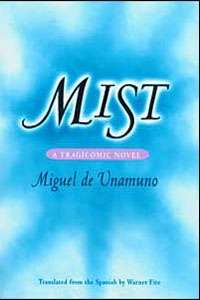Mist: A Tragicomic Novel

Editorial Illinois
Fecha de edición marzo 2000
Idioma inglés
EAN 9780252068942
352 páginas
Libro
encuadernado en tapa blanda
Resumen del libro
A towering figure of political, philosophical, and literary controversy, Miguel de Unamuno was the undisputed intellectual leader of the brilliant Generation of 1898 that ushered in a second golden age of Spanish culture. In the vast and varied body of his work, none conveys his intellectual legacy more effectively than Mist, a monument of the philosophical novel and a masterpiece of modern experimental fiction.
Dispensing with the conventions of action, time and place, and analysis of character, Mist proceeds entirely on the strength of dialogue that reveals the struggles of what Unamuno called his "agonists." These include Augusto Perez, the pampered son of a recently deceased mother; the deceitful, scheming Eugenia, whom Augusto obsessively idealizes; and Augusto's dog Orfeo, who gives a funeral oration upon his master's death. Mist even includes a chapter that explains Unamuno's theory of the antinovel.
Anticipating later writers such as Albert Camus and Jean-Paul Sartre, Unamuno exploited fiction as a vehicle for the exploration of philosophical themes. First published in 1914, Mist exemplified a new kind of novel with which Unamuno aimed to shatter fiction's conventional illusions of reality. It is an antinovel that treats its fictionality ironically. This historic reissue includes a foreword by Theodore Ziolkowski.
Biografía del autor
Nacido en Bilbao (España) el 29 de septiembre de 1864, su tránsito de la infancia a la adolescencia se vio marcado por el fallecimiento de su padre y el posterior asedio carlista de su ciudad natal. Servirían estas vivencias como germen de su prosa y serían reflejadas en algunas de sus obras de espíritu narrativo. Estudió Filosofía y Letras en la Universidad de Madrid, para ejercer después como profesor de latín y filosofía, llegando a ser en varias ocasiones rector de la Universidad de Salamanca. Compaginó su labor docente con la publicación de múltiples ensayos, relatos, obras de teatro, poemarios y novelas que evidenciaron su magnífica capacidad intelectual, así como ofrecieron al mundo una visión de sus convicciones y creencias. Es probablemente Niebla (1907) su obra más conocida, junto a Tres novelas ejemplares y un prólogo (1920). Exponente de la generación del 98 y gran inconformista, falleció en 1936 en Salamanca, siendo la causa de su muerte objeto de gran cuestionamiento. Años atrás había sido desterrado tras publicar unos escritos en contra del rey y de la dictadura de Primo de Rivera.








